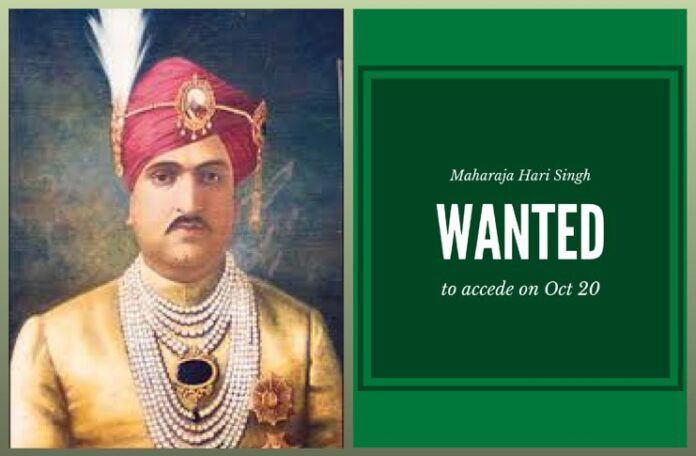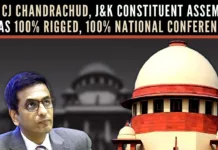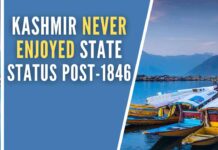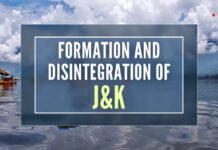
The British quit India on August 15, 1947 after dividing British India into two Dominions – Indian Dominion and Pakistan Dominion – on religious basis. All this happened under the Indian Independence Act of 1947. 560-odd princely States in India were not part of the partition plan. Their fate was to be decided by the rulers/ princes of the respective states. They had to exercise a choice between India and Pakistan. There was no third or fourth option. They were required to exercise their choice taking into consideration the continuity factor. But more than that, there was no provision in the Independence Act which provided for limited or conditional accession.
…Prime Minister Jawaharlal Nehru barred Patel from handling the solitary State of Jammu & Kashmir.
In the newly-created Indian Dominion, the question of integrating the princely states was left to the care of the then Deputy Prime Minister and Home Minister Sardar Patel. However, Prime Minister Jawaharlal Nehru barred Patel from handling the solitary State of Jammu & Kashmir. He himself handled it and how he handled or mishandled it is not a secret. Everything is in public domain and remains a subject of discussion even after 70 years of the accession of Jammu & Kashmir with India.
I will skip what happened in Jammu & Kashmir after it acceded to the Indian Dominion on October 26. I will also not catalogue here what Pakistani barbarous regulars and irregulars did after October 19 to annex Jammu & Kashmir as everything is on record. It is history. I will focus only on that aspect which, sadly, escaped the attention even of serious researchers and commentators.
The general belief in the country is that Maharaja Hari Singh offered accession of his State only on October 26, 1947. This is not true. The fact of the matter is that he proposed accession immediately after Pakistan broke the standstill agreement and invaded Jammu & Kashmir on October 20.
It would be only prudent to quote verbatim what the then Prime Minister of Jammu & Kashmir, Mehr Chand Mahajan, wrote in this context in his autobiography Looking Back.
He wrote: “Pakistan invasion was an unprovoked act of aggression. The Maharaja had not done anything to invite it. Its objective was to take possession of the state by force. What did India do on the other hand? When we got the news of the raid, we sent our Deputy Prime Minister with a letter from His Highness to the Prime Minister and Deputy Prime Minister of India. I also sent personal letters, asking help on humanitarian grounds to save us from this unprovoked act of aggression. We also sent a letter proposing accession. The British Prime Minister was approached by cable but no response came from him. October 24 and 25, the two most anxious and most exciting days passed but no reply came from anywhere. The whole of Srinagar and the State were in danger and everyone was running for his life. Bakshi Ghulam Mohammad and his party (National Conference) had organised groups of their party men to stop people from leaving the state, not realising that they would all be killed if raiders reached Srinagar and everything would be destroyed. Sheikh Abdullah had quietly taken a plane to Delhi on the 25th evening” (p. 274).
…Pakistan had no locus standi before the Tribunal of Nations…
Mehr Chand Mahajan further wrote: “The Maharaja and the Cabinet discussed what military action they could take at the last moment to save the town (Srinagar). We had, at our disposal, a cavalry battalion, the personal guards of His Highness and a disbanded company of Muslim soldiers. Pakistan had invaded the State and overrun it while India was neither giving help nor sending even a reply to our request. We spent two more days in suspense and in organising whatever defensive action we could take with the help of the Dogra Brigadier, the guards and the police officers. Of course, we allowed the people to leave the town as best as they could…” (p. 275)
This following account of Mehr Chand Mahajan would clear all the cobwebs of confusion and establish that Maharaja Hari Singh tried his best to persuade Nehru to accept the accession proposal and help the State against the Pakistani aggression before October 26.
He wrote thus: “These coercive and aggressive acts on the part of Pakistan between the 20th of October and the 27th of October form conclusive evidence for branding it an aggressor. They afford sufficient and ample proof – if proof was needed – to hold that Pakistan had no locus standi before the Tribunal of Nations, if it has any sense of fairness and justice left in it. See in contrast India’s attitude – hesitating to sign standstill agreement, giving small help here and there by air on humanitarian grounds, indifferent to accession, no response and no reply on 24th and 25th even when armed attacks on innocent people were on and loot, arson and butchery were going on…”(p. 276)
It was under these circumstances that Mehr Chand Mahajan went to Delhi to meet Nehru and negotiate the accession issue. He met with Nehru and Patel and apprised them of the serious and dangerous situation in the state. He also solicited military support and urged them to send the Army at once, saying “the whole of town of Srinagar and all we held valuable would be completely destroyed” (P-277).
…I was assured that even if Srinagar fell in Pak hands, it would be retaken.
– Mehr Chand Mahajan, Prime Minister of Kashmir
And see the kind of response Mehr Chand Mahajan’s passionate plea evoked. Let me quote Mehr Chand Mahajan himself: “I was asked how an Army could be sent at a moment’s notice. I was assured that even if Srinagar fell in Pak hands, it would be retaken. I was not impressed and took up a firm attitude and said, ‘Give army, take accession… otherwise I will go and negotiate terms with Mr Jinnah as the city must be saved’. On this, the Prime Minister flew into a rage and gave an exhibition of his temper and told me to get out. Just as I rose to leave, an accident occurred that saved Kashmir from falling into Pak hands. Sheikh Abdullah who was staying in the Prime Minister’s house was overhearing the talks. Sensing a critical situation, he sent a slip of paper to the Prime Minister. The Prime Minister read it and his attitude completely changed”.
Nehru accepted the accession offer and agreed to send the Army but with the condition that Maharaja Hari Singh would abdicate his authority in favour of Sheikh Abdullah, his friend. Mehr Chand Mahajan accepted the condition and the Army landed in Kashmir on October 27.
Had Nehru and his Cabinet accepted the Maharaja Hari Singh’s earlier accession proposal, Pakistan would not have been able to annex parts of Jammu province, Kashmir and Ladakh region and there would not have been what we today call Pakistan-occupied-Jammu & Kashmir (PoJK). However, to say this is not to suggest that India was not in a position to retrieve these occupied areas. It was but Nehru at the behest of Sheikh Abdullah ordered a strict ceasefire at a time when the advancing Indian Army had the Pakistani invaders on the run.
The point is that it was Delhi which committed three blunders between October 20 and 27. One was that it didn’t accept Maharaja Hari Singh’s accession proposal before October 26. The other was that it made Sheikh Abdullah a party to the accession despite the fact that he had no locus standi in the matter. In other words, Delhi negated the very process the Indian Independence Act had prescribed for the accession business. And the third was that Delhi barred the advancing Army from recapturing the Jammu & Kashmir territories from Pakistan.
For one man, Sheikh Abdullah, Nehru put at stake everything.
All this should set the record straight and help us understand what Nehru did or not did and what he actually stood for. For one man, Sheikh Abdullah, Nehru put at stake everything.
It would be only desirable to say that the Indian nation is paying through its nose since 1947 for these three follies and the follies which followed these follies post-October 1947.
One can only hope that Prime Minister Narendra Modi would undo all these past wrongs and start from a scratch to build up that Jammu & Kashmir that talks India and walks India. The Nehruvian approach has to go lock, stock and barrel if Jammu & Kashmir is to remain part of India. To be more precise, integrations have to be promoted and strengthened and separatists and communalists in Kashmir have to be reined in, isolated and brought to justice.
- ‘Kashmir My core constituency’: Revisiting July 12, 2003 to understand politics, Omar Abdullah-style - March 15, 2024
- Total deviation from traditional approach: Seven takeaways from PM Modi’s March 7 Srinagar visit - March 9, 2024
- Status of political parties: Why is further J&K reorganization imperative? - March 1, 2024











Readers are free to express their views and make comments, but no one has any right to use unfair expressions and opinions regarding persons of the Indian leaders who held the assignments. Any body can do a mistake but attributing that to ones otherwise intentions without put some revealing substance too along is not fair. Pushkarnath ji has requested the writer to also make public some official documents including the Accession letter of 20th Oct of Hari Singh Ji addressed to Governor General of India / GOI There is nothing wrong in that .
This story is based on lies.Jammu& Kashmir was being looked after by the State department headed by Sardar Patel .There is no document to show that Maharaja Harisingh in September 1947 wrote to Nehru for accession to India.If the writer has some documents he should bring to public domain.The maharaja ,however,submitted a Standstill agreement to both India and Pakistan and the latter accepted it.As late as Jan,1948 when India took the issue to UN Sir Gopalswamy Inengar who was PM of Maharaja Hari Singh for six years was entrusted the Job for Kashmir affairs.To have some knowledge about Integeration of States including J&k one should read the book written by Late V.P Menon ,the Secy State Department. The author has dedicated the book to Sardar Patel and devoted two chapters on the happenings in J&k.Any new document will definetly will add to our knowledge and will give the actual position at that time .It may not be out of place to mention here that Shiekh Mohmad Abdullah was the tallest leader of KASHMIR at that time and the minority community leaders supported him.
Read M O Mathai book “My days with Nehru” which is banned by the Govt in 1977.There are unheard true stories.
One thing which really annoys or questions my mind is WHY did Gandhi succumb under pressure to give way to the Chor Nehru to be the CONg president & 1st PM… What was the pressure about ?? Did Nehru hold something bout Gandhi which he did not want to be made public or wat was the real reason Gandhi favouring Nehru ?? There had to be something which made Gandhi fall under pressure… Not that I support him in anyway. 2 biggest humanity blunders wud be Gandhi & Nehru… Wat karma did their parents did in their past life to give birth to such Zilch characters…
Well the real reason was Nehru wanted to have Azad Kashmir, so that just in case if Subhashchandra Bose ( whom he feared not dead) returns & under public pressure Nehru had to vacate the PM post forever or if Patel revolts post Gandhi (whenever that might hv happened), he van go back to Kashim, be the Wazir-e-Azam to rule a country i.e. Kashmir.
Awesome !
What a sad state of affairs! What ill-fate India was siezed of! So, going by the facts, Our first PM was the culprit. Sounds strange! How could a PM not accept a State’s accession? What kind of PM we had? For all this mess, the blame squarely rests on Mahatma Gandhi. According to the history, it was alleged that Mahatma co-erced Sardar Vallabh Bhai Patel to handover the reins of India to Nehru, despite the fact that Sardar Patel has the support of 12 out of 15 State / Regional Congress Committees while the remaining three abstained from voting. This means, Sardar won the Congress Presidenship and thereby the eligibility to PM’s post while Nehru did not receive a single vote. These 15 state congress committee presidents knew that Gandhi openly supported the candidature of Nehru, yet they defied even Gandhi and preferred Patel to be the nation’s president. When Nehru sulked and ranted before Gandhi venting out his frustration, Gandhi called Patel and co-erced him to make way for Nehru. Patel, the disciplined soldier that he is, he immediately handed over the reins to this shortsighted Nehru. Had Gandhi not succumbed to Nehru’s rantings, the Kashmir would not have been lost to pakis. Since Nehru was in power, this reality found its place in footnotes in the history of India, and Patel’s contribution to India and his statesmanship has been lost in the debris of History. Thanks to Narendra Modi sir, our dear Prime Minister, who knowing the full truth has pulled Patel out from the footnotes of History and onto the bigger canvas, thus rewriting the history of Indian Independence in correct perspective. Now, Modi ought to undo the deeds of shortsighted Nehru vis-a-vis Kashmir and Art.370 etc.
All that mis-handling of J&K issue was due to that egoistic Nehru and his treachery towards Bharat. How can a man so angry about the army for accession proposal suddenly turn pleasant with one slip of paper from Abdullah? Shows he was in cahoots with the treacherous Abdullah to grab power. This dirty partnership of Nehru-Abdullah created a monster. Their rule with the dreamt up Mughal fancy titles like Wazir-E-Azam (Prime Minister) etc. Why? To create a Country within a Country of Bharat? For Abdullah the pal to also be made a Wazir E Azam while the other pal Nehru to become “Wazir – Azam” (Prime Minister) of Bharat? To go to UN later to show off as a world’s stateman? It was sheer contempt and jealousy towards a ruler since the Maharaja had power and prestige which this Nehru so coveted. He eventually crowned himself “Pandit” and left us this terrorist legacy of an un-Pundit like stupidity of his. Nehru’s dream of becoming a successor to Mughal dynasty gave us this tragedy of J&K. Today we have the real pandits living as refugees within their own country when they are fully entitled to live as equals with luxuries what all other Bharatiyas have.
Read this blog and everything will be clear as crystal as to who nehru was and who sheikh abdulla was(especially the last part of the blog).here’s the link:
http://www.speakingtree.in/blog/hidden-facts-about-the-nehru-gandhi-dynasty-178195